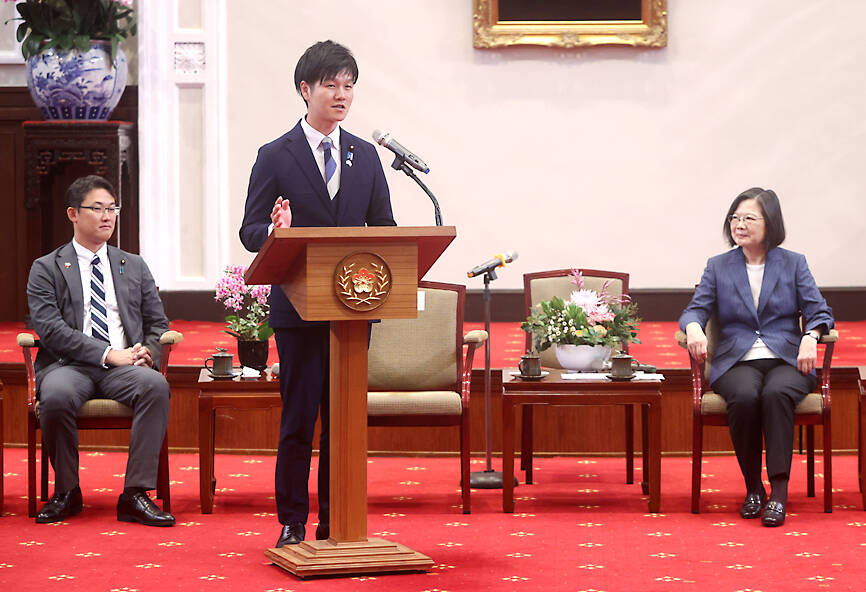Japan would welcome Taiwan’s participation in the Comprehensive and Progressive Agreement for Trans-Pacific Partnership (CPTPP), Japanese Liberal Democratic Party (LDP) Youth Division director Norikazu Suzuki said at a meeting with President Tsai Ing-wen (蔡英文) at the Presidential Office in Taipei yesterday.
The Youth Division has cooperated and promoted exchanges with Taiwan for more than 50 years, and will continue to uphold this tradition and bolster bilateral ties, said Suzuki, who arrived on Sunday as the leader of a 65-member LDP delegation.
As former Japanese prime minister Taro Aso, who was also a Youth Division director, said during his trip to Taiwan earlier this month, Japan and Taiwan will face various challenges side by side, Suzuki said.

Photo: CNA
Taiwan is an important partner which, like Japan, values democracy and human rights, he said, adding that the two sides have formed close economic and people-to-people ties.
The importance of peace and stability in the Taiwan Strait was reaffirmed at the G7 summit in Hiroshima, Japan, in May, as it is closely linked to the interests of Japan and the world, he said.
The mainstream public opinion in Japan is that a unilateral change of the “status quo” in the Taiwan Strait is absolutely unacceptable, he said, adding that it is important to convey this message to the international community.
Regarding Taiwan’s application to join the CPTPP, the Youth Division will do its best to assist Taiwan in joining the bloc, he said.
Heading to Palau with a few delegation members and several Taiwanese legislators today, Suzuki said that he hoped that Japan and Taiwan could cooperate to facilitate peaceful and stable development in the Indo-Pacific region.
Welcoming the delegation to Taiwan, Tsai said she had told Suzuki when he visited Taiwan in May that Taiwan and Japan should work together to promote the participation of young people in politics.
Tsai thanked Tokyo for speaking up for Taiwan at international events and supporting its global participation.
The two countries are “good friends who support each other and important partners in fields such as trade, tourism and technology,” she said.
To tackle current global challenges such as climate change and disinformation, Taiwan and Japan can cooperate and share experience, she said, adding that she hoped to see young people participate in the process.
Taiwan has been learning from Japan to promote regional revitalization and assist young people in returning to their hometowns to work, Tsai said.
The president added that she hoped to see more interactions and discussions between young Taiwanese and Japanese on key issues.

MAKING WAVES: China’s maritime militia could become a nontraditional threat in war, clogging up shipping lanes to prevent US or Japanese intervention, a report said About 1,900 Chinese ships flying flags of convenience and fishing vessels that participated in China’s military exercises around Taiwan last month and in January last year have been listed for monitoring, Coast Guard Administration (CGA) Deputy Director-General Hsieh Ching-chin (謝慶欽) said yesterday. Following amendments to the Commercial Port Act (商港法) and the Law of Ships (船舶法) last month, the CGA can designate possible berthing areas or deny ports of call for vessels suspected of loitering around areas where undersea cables can be accessed, Oceans Affairs Council Minister Kuan Bi-ling (管碧玲) said. The list of suspected ships, originally 300, had risen to about

DAREDEVIL: Honnold said it had always been a dream of his to climb Taipei 101, while a Netflix producer said the skyscraper was ‘a real icon of this country’ US climber Alex Honnold yesterday took on Taiwan’s tallest building, becoming the first person to scale Taipei 101 without a rope, harness or safety net. Hundreds of spectators gathered at the base of the 101-story skyscraper to watch Honnold, 40, embark on his daredevil feat, which was also broadcast live on Netflix. Dressed in a red T-shirt and yellow custom-made climbing shoes, Honnold swiftly moved up the southeast face of the glass and steel building. At one point, he stepped onto a platform midway up to wave down at fans and onlookers who were taking photos. People watching from inside

Japan’s strategic alliance with the US would collapse if Tokyo were to turn away from a conflict in Taiwan, Japanese Prime Minister Sanae Takaichi said yesterday, but distanced herself from previous comments that suggested a possible military response in such an event. Takaichi expressed her latest views on a nationally broadcast TV program late on Monday, where an opposition party leader criticized her for igniting tensions with China with the earlier remarks. Ties between Japan and China have sunk to the worst level in years after Takaichi said in November that a hypothetical Chinese attack on Taiwan could bring about a Japanese

STREAMLINED: The dedicated funding would allow the US to transfer equipment to Taiwan when needed and order upgraded replacements for stockpiles, a source said The US House of Representatives on Thursday passed a defense appropriations bill totaling US$838.7 billion, of which US$1 billion is to be allocated to reinforcing security cooperation with Taiwan and US$150 million to replace defense articles provided to the nation. These are part of the Consolidated Appropriation Act, which the US House yesterday passed with 341 votes in favor and 88 against. The act must be passed by the US Senate before Friday next week to avoid another government shutdown. The US House Committee on Appropriations on Monday unveiled the act, saying that it allocates US$1 billion for the Taiwan Security Cooperation Initiative